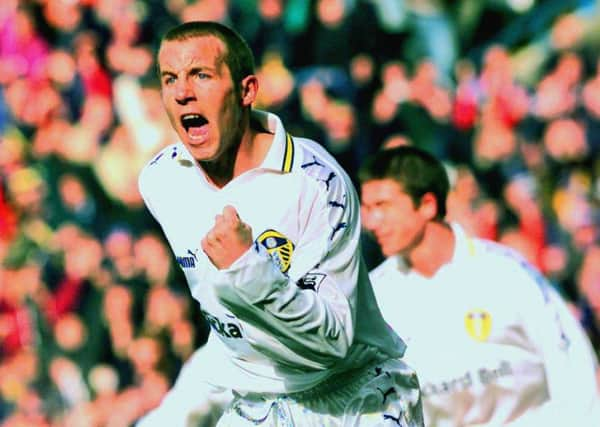Leeds United nostalgia: Bowyer found his niche at Leeds under O'Leary


Wilkinson found no way of filling the holes immediately and he was sacked as manager within three months of those transfers, but one of his parting gifts – the £2.8m signing of Lee Bowyer from Charlton Athletic – would benefit Leeds for years to come.
At the time, 19-year-old Bowyer was a raw replacement for players like Speed and McAllister, both of whom had carried the flag for United during the best moments of Wilkinson’s reign, but the investment in him was wonderfully astute.
Advertisement
Hide AdAdvertisement
Hide AdThe fee for Bowyer was a record amount paid for a British teenager and his reputation had grown in two years as a professional at Charlton.
He was signed to full-time forms at the age of 17 and defied his small size with an explosive, energetic and box-to-box game. Disciplinary issues at The Valley forewarned Leeds about the baggage Bowyer brought with him, but he went on to be the heartbeat of United’s run to the Champions League semi-finals in 2001. Initially, his impact was less auspicious. Wilkinson’s grip on his job was slipping in the summer when Bowyer joined and his final game as manager, a 4-0 defeat to Manchester United, saw Bowyer suffer a nasty eye injury. A ball to the face left him with a detached retina. Bowyer later told the Independent: “I came round after the operation thinking ‘this is good. I’m 19, blind in one eye, and the manager who signed me has left...’”
Bowyer was absent for two months, eventually returning in November by which time George Graham had settled in as Wilkinson’s successor.
Graham was known for his defensive traits, but he warmed to Bowyer gradually and used him regularly. Bowyer, as was his style, chipped in with six goals in his first season, including a winner at Sunderland in late February. Results like that helped to keep Leeds away from serious relegation trouble. Graham, in Bowyer’s words, taught him the “dirty side of the game” and drummed into him the need to contribute at both ends of the pitch.
Advertisement
Hide AdAdvertisement
Hide Ad“I turned up from Charlton and he (Graham) dropped me because I’d leave it to other people to defend,” Bowyer said in an interview last year. “With George, you had to do the dirty side of the game.
“He only picked me when he thought I was ready to do what he wanted. I was 19 and it was a tough lesson, not to leave your team-mates in the lurch. I owe him a lot.”
Bowyer worked with Graham for two years until the Scot’s departure to Tottenham Hotspur in October 1998 gave his assistant, David O’Leary, a first chance in management. If Graham had schooled Bowyer, O’Leary brought him to his peak, finding the midfielder’s niche in the memorable 2000-01 season which preceded United’s spectacular decline.
His barnstorming form in that campaign and the court case which ran alongside it came to define his spell as a Leeds player; the best of times and the worst of times. The Football Association refused to allow his selection for England while criminal proceedings against him were ongoing and Bowyer finished his career with a single cap, earned in a friendly against Portugal in 2002.
Advertisement
Hide AdAdvertisement
Hide AdSeven years later, with the 2010 World Cup looming, Bowyer told the Guardian: “I could score 20 goals this season but there is absolutely no way I am going to be on that plane to the World Cup. No way whatsoever. There are too many people who have made up their minds about me and wouldn’t want me anywhere near the England team. That’s been the case for 10 years now.”